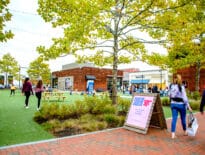
A rendering shows how MassDOT's preferred design for the Allston Multimodal Project would transform the east-facing view along Soldiers Field Road. Image courtesy of MassDOT
Potentially coming soon to a sliver of Allston land near you: four rail tracks, eight lanes of the Massachusetts Turnpike, four lanes of Soldiers Field Road, and a pedestrian boardwalk over the Charles River, all laid out side-by-side.
Ten years after discussions on the project started and after years of opposing the idea, the Baker administration on Wednesday embraced a design for a once-in-a-generation, $1.7 billion infrastructure overhaul in Allston that would replace an aging highway viaduct by aligning train, highway and pedestrian infrastructure at roughly the same elevation without pushing roadways onto the riverbank.
Community groups and transportation advocates have long championed that option, pitching it as the best way to balance the various modes of transportation that converge on a narrow stretch of land between Boston University and the river.
The state Department of Transportation now agrees, touting additional benefits such as a straighter turnpike alignment that will make driving conditions safer, a wider Paul Dudley White Path for bicyclists and pedestrians, and an “improved gateway into the city.”
“It took hard work, and hard work pays off, because what we ended up with is something that’s far better for the city, the region and the state than having to replicate 1960s highway design and having to be stuck with an elevated structure in that part of the city,” Rick Dimino, president of the A Better City business group involved in discussions about the project, said in an interview.
The agreement also removes a major obstacle to Harvard University’s plans to develop a large, former rail yard currently hemmed in by the Pike, but which will lie to its north once the highway is realigned, and the building of West Station, a bus-and-commuter rail hub for the MBTA seen as key to helping Allston grow into another major commercial center for the Boston area.
Harvard has already begun the very early stages of its Allston redevelopment plans – filing plans with Boston officials for a 1 million-square-foot first phase of its 36-acre “Enterprise Research Campus” next to Harvard Business School – but the exact timing of which parts it and contracted developer Tishman Speyer of the “Allston Landing South” area will be redeveloped firsts is uncertain.
“Wednesday’s announcement reflects an exciting milestone and we applaud the Commonwealth’s progress on a generational opportunity for greater Boston and beyond,” Harvard University spokesperson Brigid O’Rourke said in an emailed statement. “The Modified At-Grade design option has benefited from strong support across the community and is a pivotal step toward realizing a shared vision for creating neighborhood connectivity, expanding green space, increasing regional transit opportunities and enabling new economic development potential for the region. The project presents a transformative opportunity that will benefit not only the City of Boston, but also the entire region, and Harvard looks forward to continuing to work closely with the Commonwealth as this work advances in the months ahead.”
Officials will still need to conduct analysis on the other two alternatives, which involved stacking highway lanes in varying layouts, but state Highway Administrator Jonathan Gulliver said the administration’s support for the at-grade option means workers will not need to “simultaneously design three different options to answer one question.”
“This really clears the deck for our engineering team to focus their resources on advancing this particular project,” Gulliver told the News Service. “Now we can focus on advancing this design. We have high confidence it’s going to make it through the permitting process, that it will be the preferred alternative when we get to the appropriate stage, and that we can now focus our resources on where they’re needed.”
Current estimates peg the total project price at $1.7 billion and the project timeline at eight to 10 years. Gulliver said both figures could change because MassDOT remains at a “very preliminary stage of design.”
It’s also not yet clear how Massachusetts will finance the full project. Gulliver said he expects the city of Boston, land owner Harvard University and other stakeholders to contribute. The state will also use toll revenue from the turnpike, though it will not increase tolls beyond existing levels, Gulliver said.
Federal funding will play a major role, and Gulliver said administration officials are “closely watching what’s happening in Washington” as the U.S. House prepares to vote on a $1 trillion infrastructure bill.






